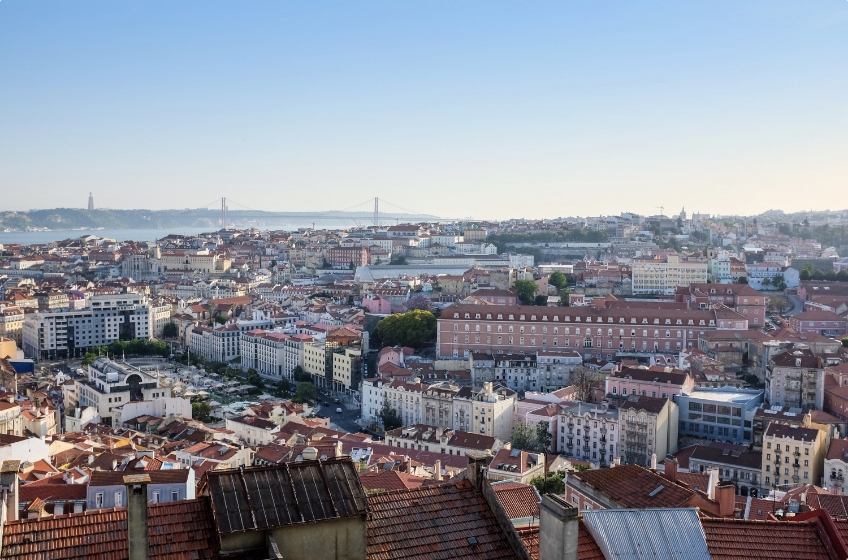By 2024, the market is expected to be valued at 1.48€ trillion, largely driven by the residential sector, which will contribute 1.2€ trillion. The estimated Compound Annual Growth Rate (CAGR) of 4.97% from 2024 to 2029 highlights a steady and robust growth pattern, pushing the market value to 1.88€ trillion by 2029.
International investors are increasingly drawn to Portugal due to favorable economic conditions and investment opportunities, adding to the market’s momentum. To put this into context the US market is expected to hit an impressive 119€ trillion in 2024. The vast difference in scale underscores the U.S.’s real estate market dominance. The UK market in 2023 was an impressive £15.3 trillion.
Portugal’s real estate boom, however, is fueled by attractive yields, residency programs, and a growing appeal to foreign buyers, particularly in the residential and luxury segments.
The real estate market in Portugal is currently in a dynamic phase of growth, influenced by a range of customer preferences, market trends, special local circumstances, and favorable macroeconomic conditions. Here’s a breakdown of the key drivers:
Customer Preferences: Both domestic and international buyers are increasingly attracted to Portugal due to its scenic landscapes, rich cultural heritage, and relatively affordable cost of living. International buyers, including expatriates and retirees, have shown growing interest in acquiring holiday homes, investment properties, or retirement residences.
What are the affecting Market Trends:
Tourism-related Investments: Portugal’s thriving tourism industry has led to a surge in demand for accommodation in popular areas like Lisbon, Porto, and the Algarve. This has prompted significant investments in hotels, resorts, and short-term rental properties.
Urban Living: The rising preference for city life, particularly among young professionals and families, has driven high demand for urban residential properties. Cities like Lisbon have experienced rising property prices as more people seek vibrant, well-connected urban environments with job opportunities and cultural amenities.
Local Special Circumstances: The Golden Visa scheme, a government initiative offering residency to non-EU citizens who invest in Portuguese real estate, has successfully attracted foreign investors. Buyers from China, Brazil, Angola, and other countries are particularly drawn to this opportunity.
According to statista.com 7€ billion transactions took place between 2014 and 2023. Macroeconomic Factors: Portugal’s economic recovery following the global financial crisis has been steady, with GDP growth, declining unemployment, and economic stability contributing to a favorable investment climate. Additionally, low interest rates and favorable mortgage conditions have made homeownership more accessible, boosting real estate investments across various buyer segments.
These factors combined have positioned Portugal as an appealing destination for real estate investment, with continued growth prospects driven by both tourism and urban development. If you would like to chat through any of the information supplied mail me on mail@bpaproperty.com Sources: Statista.com Ibisworld.com Bpaproperty.comBy 2024, the market is expected to be valued at 1.48€ trillion, largely driven by the residential sector, which will contribute 1.2€ trillion.
The estimated Compound Annual Growth Rate (CAGR) of 4.97% from 2024 to 2029 highlights a steady and robust growth pattern, pushing the market value to 1.88€ trillion by 2029. International investors are increasingly drawn to Portugal due to favorable economic conditions and investment opportunities, adding to the market’s momentum.
To put this into context the US market is expected to hit an impressive 119€ trillion in 2024. The vast difference in scale underscores the U.S.’s real estate market dominance. The UK market in 2023 was an impressive £15.3 trillion. Portugal’s real estate boom, however, is fueled by attractive yields, residency programs, and a growing appeal to foreign buyers, particularly in the residential and luxury segments.
The real estate market in Portugal is currently in a dynamic phase of growth, influenced by a range of customer preferences, market trends, special local circumstances, and favorable macroeconomic conditions. Here’s a breakdown of the key drivers: Customer Preferences: Both domestic and international buyers are increasingly attracted to Portugal due to its scenic landscapes, rich cultural heritage, and relatively affordable cost of living. International buyers, including expatriates and retirees, have shown growing interest in acquiring holiday homes, investment properties, or retirement residences. What are the affecting Market Trends: Tourism-related Investments: Portugal’s thriving tourism industry has led to a surge in demand for accommodation in popular areas like Lisbon, Porto, and the Algarve.
This has prompted significant investments in hotels, resorts, and short-term rental properties. Urban Living: The rising preference for city life, particularly among young professionals and families, has driven high demand for urban residential properties. Cities like Lisbon have experienced rising property prices as more people seek vibrant, well-connected urban environments with job opportunities and cultural amenities. Local Special Circumstances: The Golden Visa scheme, a government initiative offering residency to non-EU citizens who invest in Portuguese real estate, has successfully attracted foreign investors. Buyers from China, Brazil, Angola, and other countries are particularly drawn to this opportunity.
According to statista.com 7€ billion transactions took place between 2014 and 2023. Macroeconomic Factors: Portugal’s economic recovery following the global financial crisis has been steady, with GDP growth, declining unemployment, and economic stability contributing to a favorable investment climate. Additionally, low interest rates and favorable mortgage conditions have made homeownership more accessible, boosting real estate investments across various buyer segments.
These factors combined have positioned Portugal as an appealing destination for real estate investment, with continued growth prospects driven by both tourism and urban development. If you would like to chat through any of the information supplied mail me on mail@bpaproperty.com Sources: Statista.com Ibisworld.com Bpaproperty.com

